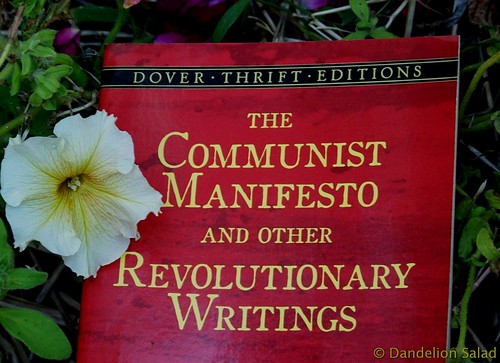Greatest AudioBooks on Nov 2, 2012
The Communist Manifesto was conceived as an outline of the basic beliefs of the Communist movement. The authors believed that the European Powers were universally afraid of the nascent movement, and were condemning as “communist,” people or activities that did not actually conform to what the Communists believed. This Manifesto, then, became a manual for their beliefs.
In it we find Marx and Engel’s rehearsal of the idea that Capital has stolen away the work of the artisan and peasant by building up factories to produce goods cheaply. The efficiency of Capital depends, then, on the wage laborers who staff the factories and how little they will accept in order to have work. This concentrates power and money in a Bourgeois class that profits from the disunity of workers (Proletarians), who only receive a subsistence wage.
If workers unite in a class struggle against the bourgeois, using riot and strikes as weapons, they will eventually overthrow the bourgeois and replace them as a ruling class. Communists further believe in and lay out a system of reforms to transform into a classless, stateless society, thus distinguishing themselves from various flavors of Socialism, which would be content to have workers remain the ruling class after the revolution.
The Manifesto caused a huge amount of discussion for its support for a forcible overthrow of the existing politics and society. (Summary by Mark F. Smith)
Section 1 – Bourgeois and Proletarians by Karl Marx & Friedrich Engels — 00:00:00
Section 2 – Proletarians and Communists by Karl Marx & Friedrich Engels — 00:36:00
Section 3 – Socialist & Communist Literature; & Section 4 – Position of the Communists in Relation to the Various Existing Opposition Parties by Karl Marx & Friedrich Engels — 00:59:23
Read it online.
From the archives:
Definitions: The Bourgeoisie by Gaither Stewart
Definitions: The Proletariat by Gaither Stewart
Socialism, Land and Banking: 2017 Compared to 1917 by Michael Hudson
What If Workers Ran Society? by Elizabeth Schulte
Caleb Maupin in Red Square: Let’s Talk About Communism!
The Difference Between Socialism, Communism, and Marxism Explained by a Marxist
Understanding Marx by William T. Hathaway


Pingback: The Communist Manifesto by Karl Marx and Friedrich Engels – Dandelion Salad
Pingback: The Revolutionary Dictatorship of the Proletariat, by Birrion Sondahl – Dandelion Salad
Pingback: Marx in the House: Episode 3: Rent Gap + Episode 4: Disinvestment – Dandelion Salad
Pingback: Marx in the House: Episode 1: Intro: Gentrification and Housing + Episode 2: Exchange Value – Dandelion Salad
Pingback: Caleb Maupin: Social Democracy: What It Is and How Communists Relate To It – Dandelion Salad
Pingback: Will Griffin: The Mass Line: A Communist Method of Organizing + What is the Mass Line? – Dandelion Salad
Pingback: The Science of Marxism – Dandelion Salad
Pingback: Caleb Maupin: History and Overview of Marxism in 12 Minutes + Socialist Heroism in Our Time – Dandelion Salad
Pingback: Caleb Maupin: The Thing About “Cultural Marxism” + Abby Martin and Richard Wolff: Debunking Jordan Peterson’s “Cultural Marxism” – Dandelion Salad
Pingback: Caleb Maupin: The Actual Nature of Revolution – Dandelion Salad
Pingback: The Difference Between Socialism, Communism, and Marxism Explained by a Marxist – Dandelion Salad
Pingback: Michael Roberts: Marx’s Laws of Motion in 30 Minutes + Cliff Bowman: Marx’s Theory of Economic Crisis – Dandelion Salad
Pingback: Caleb Maupin: Socialism Will Save America! – Dandelion Salad
Pingback: Who Is Karl Marx, The Critic? by The Anti-Social Socialist – Dandelion Salad
Pingback: Definitions: The Proletariat by Gaither Stewart – Dandelion Salad
Pingback: What Were George Orwell’s Political Views? by The Anti-Social Socialist – Dandelion Salad
Pingback: Communist Manifestoon – Dandelion Salad
Pingback: Happy 200th Birthday Karl Marx! – Dandelion Salad
Pingback: Plutocracy IV: Gangsters for Capitalism (must-see) – Dandelion Salad
Pingback: Caleb Maupin: Jordan Peterson is Wrong About Marxism – Dandelion Salad
Pingback: David Harvey: What is Neoliberalism? – Dandelion Salad
The Communist Manifesto should be read more widely!
Yes.
Pingback: Global Rollback: After Communism by Michael Parenti – Dandelion Salad
Pingback: Abby Martin and Brian Becker: The First Time The Red Flag Was Waved – Dandelion Salad
Pingback: What is Socialism? Parts 1-7 – Dandelion Salad
Thanks for posting this Lo. I read it when I was about sixteen, probably quite soon after Kennedy was assassinated.
As an enthusiast for the cultural avant-garde, I found myself in complete agreement with its radical ethos that communicated its obvious sense to my youthful, rebellious and establishment-alienated self. Growing up in bleak, class-ridden Britain, this was also when Private Eye, Carnaby Street, Mary Quant and then, the Beatles & Biba were starting to claim our attention and attract our participatory engagement.
So it will be interesting to revisit this text in a more mature frame of mind, and also from the deeper context I am now more conversant with; like C19th French radicalism, the emergence of the British Labour movement, and the enormously significant metaphysical, scientific and creative developments of the early 1900’s.
Great, David, please do enjoy listening or reading it again.
Pingback: The Not-Radical “Socialist” From Vermont by Paul Street – Dandelion Salad